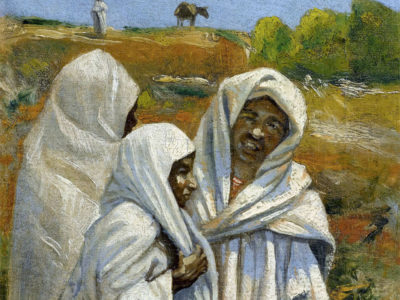CHRISTIANS GRUMBLED from the very beginning.
It’s written into the story of how the church got started.
Once a week I’m letting you take a peek inside the new paraphrase of Acts—the story of what happened after Jesus left the planet. It’s a beta edition, still getting proofed and polished for the Casual English Bible—a new Bible paraphrase especially for newcomers to the Bible.
Acts 6. When the Church started grumbling
Soup kitchen: first non-preaching ministry
6:1. In time, the number of believers[1] in Jerusalem started growing again. Greek-speaking believers who had moved to the Jewish homeland[2] said their needy widows weren’t getting a fair share of the free food, compared to what the local Hebrew-speaking widows were getting.
6:2. The Twelve called a meeting of the entire group. They said, “The 12 of us need to spend our time teaching you what Jesus taught us. We shouldn’t spend our time serving food, which is work other people could do.
6:3. So here’s what we’re asking, friends. We want you to pick seven men. They should be well-respected, wise, and full of God’s Spirit. We’ll give them the job of running this ministry program for the needy.
6:4. This way, we can spend more time praying and more time teaching you what Jesus taught us.”
6:5. The group agreed this was a great idea. They picked Stephen, a man of faith and full of the Holy Spirit. They also chose Philip, Prochorus, Nicanor, Timon, Parmenas, and Nicolas, a convert[3] from Antioch.
6:6. The group presented these men to the apostles, who put their hands[4] on the men and prayed for them.
6:7. God’s message continued to spread. A lot more people in Jerusalem joined the group—this included many Jewish priests.
Stephen under arrest
6:8. Stephen, a gracious and strong-minded man, began performing incredible miracles. People saw this as a sign that his power came from God.
6:9. One day, Stephen got into an argument with some Jews from the Freed Slaves Synagogue,[5] as people came to call it. The men who started this argument came from Cyrene, Alexandria, Cilicia, and the Roman province of Asia.[6]
6:10. All of those men together, however, couldn’t get the better of Stephen. He pulled his words from a bank of wisdom and from God’s Spirit.
6:11. So the Jews convinced some other men to testify against Stephen. The men said, “We heard him slander Moses and God, like nobody’s business. He said forbidden things about them.”
6:12. Cheerleaders for a riot, these men stoked the crowd into a frenzy—this included common folks along with elders and scholars known as scribes. The crowd grabbed Stephen and took him to the Jewish Council.[7]
6:13. Called up to testify, the witnesses told their rehearsed lies. “This man won’t stop saying terrible things about this sacred Temple and the law.
6:14. We heard him say that Jesus the Nazarene[8] will tear down the Temple and change all of the customs Moses passed down to us from God.”
6:15. During the testimony, Council members watched Stephen intently. His expression looked angelic.[9]
Notes
[1] 6:1. More literally, the believers were called “disciples.” Not to be confused with the original 12 disciples of Jesus.
[2] 6:1. The literal term for “Greek-speaking believers” is “Hellenists.” That refers to people who spoke Greek as their first language. Greek was the international language of the day, much as English is widely used throughout the world today. For most Jerusalem locals, their main language was either Hebrew or Aramaic. Bible experts estimate that only about 10-20 percent of the Jews living in Jerusalem were Hellenist Jews who had moved there. Jews from other countries often moved to the Jewish homeland for the same reasons many Jews do that today.
[3] 6:5. Nicolas was not a Jew by birth. He converted to the Jewish religion. The others were apparently born Jews. The names of all seven are Greek names that were not common among local Jews. Some Bible experts say this suggests the group of believers was trying to go out of its way to accommodate the Greek-speaking Jews who complained they were not getting their fair share of food.
[4] 6:6. Often called “laying on of hands,” this was a Jewish ritual that went back at least to the time of Moses, when he transferred leadership of the Jewish people to Joshua (Numbers 27:18).
[5] 6:9. This was apparently a synagogue made up mainly of former slaves who had been freed. Some Bible experts speculate some of these Jews may have descended from Jews whom Roman general Pompeii enslaved when he invaded the Jewish homeland about 100 years earlier, in 63 BC. Synagogues weren’t just a place of worship on Saturday, the Sabbath. They were the Jewish community center—a place where Jews got together throughout the week, for teaching, prayer, and even social events.
[6] 6:9. Cyrene was a city in what is now the North African country of Libya. The man who carried the cross of Jesus came from there (Luke 23:26). Alexandria, home of a preacher named Apollos, was a city in Egypt (Acts 18:24). The apostle Paul came from the region of Cilicia (Acts 21:39), in what is now southern Turkey. Asia was an important region in what is now Western Turkey, along the coast. Ephesus was perhaps the most important city in that area.
[7] 6:12. The Council was called the Sanhedrin. See note 5:21.
[8] 6:14. Jesus came from the Galilean city of Nazareth (Luke 2:39).
[9] 6:15. Literally, “his face was like the face of an angel.” This is the only place in the Bible where this particular vague description shows up. Bible experts say it could mean that Stephen looked innocent or that his expression looked like that of someone close to God.


Leave a Reply